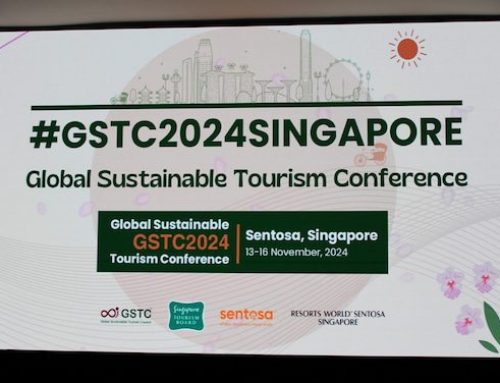The Chilean destination of Lake Llanquihue has completed the Global Sustainable Tourism Council’s (GSTC) Early Adopters pilot program to test its new Criteria and Indicators for Destinations. The destination joins the Cusco-Sacred Valley-Machu Picchu corridor in Peru as the first South American destinations to participate in and complete the GSTC Early Adoptersprogram.
The Early Adopters program is overseen by GSTC’s Destination Working Group and managed by NGO partner Sustainable Travel International (STI). The Destination Criteria complement the existing GSTC Criteria for Hotels and Tour Operators, which is the worldwide sustainability standard for tourism businesses.
Located in south central Chile in the Los Lagos Region, this tourism destination notably features Lake Llanquihue, the second largest lake in Chile, and the lake resort towns of Frutillar, Puerto Varas, Llanquihue, and Puerto Octay. Tourism is economically vital to the region, where visitors can enjoy breathtaking views of the lake and surrounding volcanoes, and partake in outdoor recreation such as skiing, hiking, hot springs, and activities in and around the lake.
“We are pleased to welcome Peru and Chile to the Early Adopters Program,” said GSTC Board Chairperson Kelly S. Bricker, Ph.D. “These two iconic South American destinations are demonstrating true global leadership. We are confident that this second and final round of our pilot program will help the GSTC continue our effort to incorporate diverse perspectives and improve the Criteria and Indicators for Destinations for world-wide application through a transparent, collaborative process,” she said.
“Chile’s participation in the GSTC Early Adopter Program is part of our national strategy to position ourselves as a sustainable destination,” Fernando Ortúzar, Regional Director of Tourism Los Lagos said. “It is a tremendous challenge for the region and posed an extraordinary opportunity for the four municipalities, the private sector and all Lake Llanquihue stakeholders to lead the development of sustainable tourism,” he said.
During a 10-day span, a sustainable destination specialist from Sustainable Travel International met with key stakeholders in Lake Llanquihue to discuss tourism, entrepreneurship, economic development, environmental conservation, and heritage protection. In Santiago, the on-site meeting opened with tourism leaders from the public and private sector, including national representatives from Sernatur,Corfo, Subsecretaría de Turismo, FEDETUR, and the tourism program at Andres Bello University, as well as individual business owners.
Sustainable Travel International met with a small working group at the beginning and end of the evaluation period, and also conducted stakeholder meetings and site visits throughout the period. More than 30 leading organizations and local leaders in tourism were consulted during the evaluation, which included a comprehensive review of the legislative and policy framework relevant to the GSTC Destination Criteria.
The report also included key sustainability areas covered by the GSTC Destination Criteria that the destination can improve upon based on the findings. Stakeholders in the destination participated in the Criteria and Indicators development process by adding their feedback.
Additional Early Adopter destinations will be announced in the coming weeks. Once feedback has been collected from the Early Adopter destinations and synthesized, the GSTC will develop and distribute a final version of the Criteria and Indicators for Destinations. The final version is expected in November 2013.
About the GSTC
The Global Sustainable Tourism Council is a global initiative dedicated to promoting sustainable tourism efforts around the world. Housed within the United Nations World Tourism Organization (UNWTO), the GSTC works to expand understanding of and access to sustainable tourism practices; helps identify and generate markets for sustainable tourism; and educates about and advocates for a set of universal principles, as defined by the Global Sustainable Tourism Criteria. The Criteria, a set of voluntary principles that provide a framework for the sustainability of tourism businesses across the globe, is the cornerstone of our initiative. For more information, visit www.gstcouncil.org.
About the GSTC Destination Criteria
A panel of business owners, academics, government officials, and other experts, who examined the UN World Tourism Organization’s Indicators of Sustainable Development and other such guidelines currently in existence, developed the GSTC’s Destination Criteria. Because the criteria are intended to describe a globally applicable set of minimum steps needed to approach sustainability, the criteria are seen as a baseline that each destination should add to or adjust as needed.
The GSTC does not aim to certify destinations as sustainable; rather, the Council will review existing certification standards and acknowledge those that meet their criteria. However, any destination will be able to use the new criteria as a guide to becoming environmentally, culturally, and socially sustainable.
About Sustainable Travel International
Sustainable Travel International is a non-profit organization with a purpose. We’ve been collaborating with destinations, businesses and travelers to implement innovative sustainable tourism development and conservation solutions since 2002. We combine the mission and transparency of a non-profit NGO with the business acumen and expertise of the private sector, ensuring our partners achieve their desired results and receive a strong return on investment.





